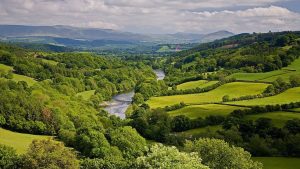The BEST: Tintern Abbey

The BEST: Lines Composed A Few Miles Above Tintern Abbey
by William Wordsworth
Reviewed by Chaim Strauchler
Summary: William Wordsworth wrote this poem, “Lines Composed A Few Miles Above Tintern Abbey,” after a walking tour with his sister in the Wye Valley in 1798. He describes his encounters with the countryside, developing these reflections into an outline of his general philosophy about nature, art, meaning, and transcendence.
Why this is The BEST: The poem captures a landscape not in an instant, but across the years of a person’s life. Wordsworth positions –both his physical and spiritual self in the context of this landscape: “Once again / Do I behold these steep and lofty cliffs, / That on a wild secluded scene impress / Thoughts of more deep seclusion; and connect / The landscape with the quiet of the sky.” He recalls how in the years between his visits (while ensconced in city life), he remembered this scenery and the emotions that it generated: “To them I may have owed another gift, / Of aspects more sublime; that blessed mood, / In which the burthen of the mystery, / In which the heavy and the weary weight / Of all this intelligible world, / Is lightened.”
Critics have noted that Wordsworth edited the industrialization taking place in Monmouthshire, Wales, from the scene. Yet, the glorification of nature is not the ultimate objective of this poem and the romantic era that it typifies. Wordsworth uses poetry to bridge between nature and the person who creates an idealized world from the material: “For I have learned / To look on nature, not as in the hour / Of thoughtless youth; but hearing oftentimes / the still, sad music of humanity, / Nor harsh nor grating, though of ample power / To chasten and subdue.”
Wordsworth celebrates the subjective power of interpretation – poetic and otherwise. For the religious person, this means seeing God within creation. For a Jewish reader, Wordsworth’s insights point to the potential to be transported by a tune during the Yamim Noraim season over different stages of a life. Yet, Wordsworth structures his experience without recourse to the exclusionary within any religious tradition. In so doing, he points to something more universal. Something within all people demands more of a landscape and of a life. These poetic tools are open to the religious person to make use of for him or herself. They are also available as a common language that might be shared.
Click here to read about “The BEST” and to see the index of all columns in this series.
[Published on November 12, 2020]

